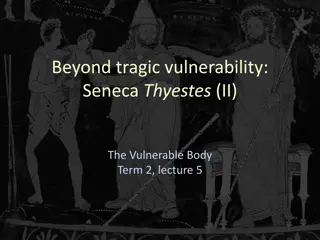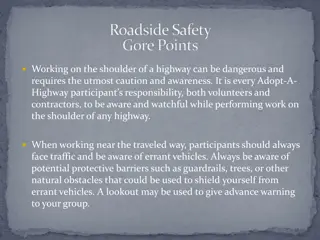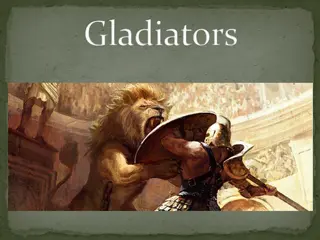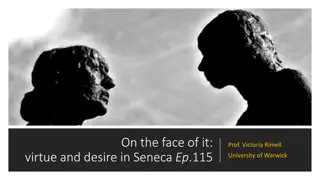Seneca on Gladiators, Gore, and the Arena
Explore Stoic perspectives on gladiators, suffering, and endurance through the works of Seneca, Cicero, and others in the arena. Discover how discipline amidst pain can lead to glory, as viewed in ancient times.
Download Presentation

Please find below an Image/Link to download the presentation.
The content on the website is provided AS IS for your information and personal use only. It may not be sold, licensed, or shared on other websites without obtaining consent from the author.If you encounter any issues during the download, it is possible that the publisher has removed the file from their server.
You are allowed to download the files provided on this website for personal or commercial use, subject to the condition that they are used lawfully. All files are the property of their respective owners.
The content on the website is provided AS IS for your information and personal use only. It may not be sold, licensed, or shared on other websites without obtaining consent from the author.
E N D
Presentation Transcript
Seneca on Gladiators, Gore, and the Arena David De Salvo
Ep. 7.3-6 casu in meridianum spectaculum incidi . . . nunc omissis nugis mera homicidia sunt. interfectores interfecturis iubent obici et victorem in aliam detinent caedem; exitus pugnantium mors est. tu quid meruisti miser ut hoc spectes?
Senecas true opinion? Misting contraption (NQ 2.9.2) Lion tamer (Ep. 85.41) Chariot races (Ira 2.14.1) Seasoned fighters (Ep. 37.1-2) Gruesome wound details (Ep. 85.29) Lacedaemonian athletics (Ben. 5.3.3)
Gladiators and the Arena as Exempla Stoic Questions: -Pain -Death -Slavery -Freedom (Stoa of Attalos)
Cicero and Seneca and the Suffering Body Cicero s praise for gladiators bearing wounds, never fleeing battle, accepting defeat: example of what can be accomplished through discipline and practice (Cic. Tusc. 2.41) destillationes et vim continuae tussis egerentem viscerum partes et febrem praecordia ipsa torrentem et sitim et artus in diversum articulis exeuntibus tortos inter haec tamen aliquis non gemuit vis tu post hoc dolorem deridere? (Sen. Ep. 78.19) (Dripping and the force of continuous coughing discharging bits of one s innards and fever that dries the very entrails and thirst and limbs twisted with joints sticking out in different ways Nevertheless, there are some who amid this have not groaned Won t you laugh at pain after an example like this?) Seneca likens suffering of illness to arena; enduring in suffering of any kind can bring glory, if only there were audiences for illness (Sen. Ep. 78.21)
Gladiator and the Sponge (Ep. 70.20-1) ibi lignum id quod ad emundanda obscena adhaerente spongia positum est totum in gulam farsit et interclusis faucibus spiritum elisit. hoc fuit morti contumeliam facere. (There he took a stick of wood with a sponge attached which was placed for the cleaning of obscene things and crammed it all down his throat, and with his jaw blocked up, he dashed out his spirit. This was to insult to death.) praeferendam esse spurcissimam mortem servituti mundissimae. (the foulest death must be preferred to the cleanest servitude.)
Gladiator and the Wheel (Ep. 70.23-5) tamquam somno premente nutaret, caput usque eo demisit donec radiis insereret, et tamdiu se in sedili suo tenuit donec cervicem circumactu rotae frangeret. (He nodded off, as if sleep were overcoming him, and he thrust down his head until he inserted it in the spokes, and he held himself in his seat until he broke his neck with the racing wheel) ille vir magnus est qui mortem sibi non tantum imperavit sed invenit. (That man is great who not only has ordered his own death, but also finds a means)
Gore Erotica? (and other competing interpretations) 1. Gore has utilitas 2. The arena embodied 3. Gore and erotica (2021 Jeep Gladiator)
Bibliography Axer, Jerzy. 1989. Tribunal-Stage-Arena: Modelling of the Communication Situation in M. Tullius Cicero s Judicial Speeches. Rhetorica: A Journal of the History of Rhetoric 7: 299 311. Barton, Carlin A. 1989. The Scandal of the Arena. Representations: 1 36. Cagniart, Pierre. 2000. The Philosopher and the Gladiator. The Classical World 93: 607 18. Craig, Patricia Marie. 2022. Seneca and the Stoic Appropriation of Tragic Exempla. Ph.D. dissertation, The Catholic University of America. Washington, DC. Edwards, Catharine. 1999. The Suffering Body: Philosophy and Pain in Seneca s Letters. In Constructions of the Classical Body, ed. J. Porter, 252-68. Ann Arbor: University of Michigan Press. Gunderson, Erik. 1996. The Ideology of the Arena. Classical Antiquity 15: 113 51. Motto, Anna Lydia. 1955. Seneca on Death and Immortality. The Classical Journal 50: 187-9 Noyes, Russell. 1973. Seneca on Death. Journal of Religion and Health 12: 223 40. Olberding, Amy. 2008. A Little Throat Cutting in the Meantime : Seneca s Violent Imagery. Philosophy and Literature 32: 130 44. Papakonstantinou, Zinon. 2010. Sport in the Cultures of the Ancient World: New Perspectives. London and New York: Routledge. Reid, Heather L. 2006. Was the Roman Gladiator an Athlete? Journal of the Philosophy of Sport 33: 37 49.



![READ [PDF] Trickster Caught: An Alien Gladiator Romance (Gladiators of the Vaga](/thumb/42236/read-pdf-trickster-caught-an-alien-gladiator-romance-gladiators-of-the-vaga.jpg)



















